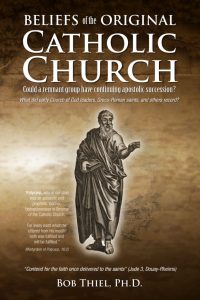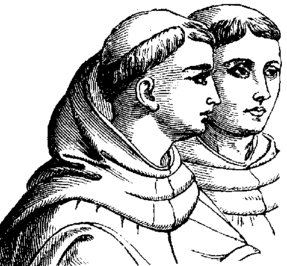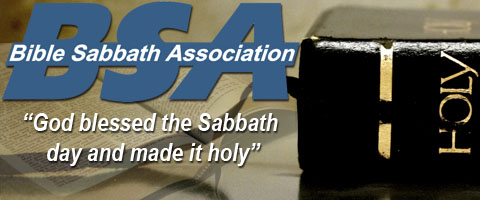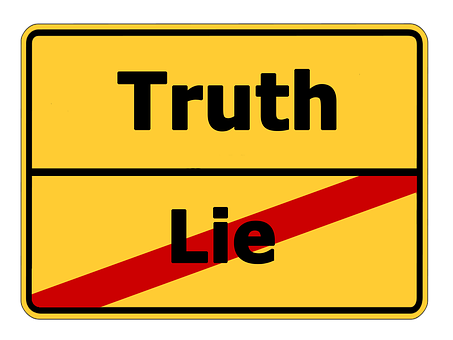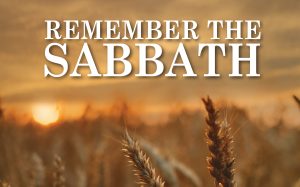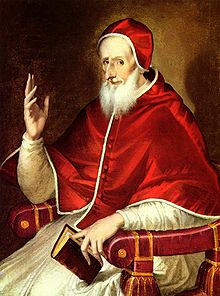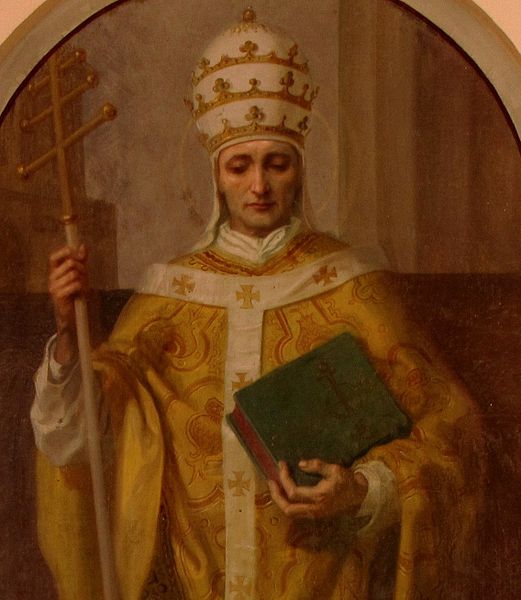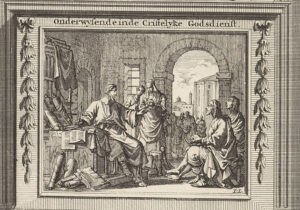Thus, sometimes I will respond to Banned posts, though most of the time I do not.
Anyway, on Friday, there was a post at the Banned site that was wrong about church history and the Sabbath, so I decided to cite scriptures and historical documents to show that the position taken was wrong (see The Sabbath in the first centuries of the Christian Church).
Instead of providing any proof to back up the false statement, “Sunday was a day highly regarded by ALL Christians by the close of the First Century,” yesterday’s Banned “rebuttal” post cited three historical sources.
Two of the three sources provided at Banned had to do with the second century, hence are not proof about the first century.
But there was one from a document that may have originated in the first century (scholars have debated that) called the Didache. Scholars recognize that although that document is claimed to have been written by the twelve apostles, it was not. So, that of itself should set off alarms to any who claim it speaks for ALL Christianity at the time it was written–because it most certainly does not.
Instead of studying this to learn, the poster at Banned instead referred to both of those documents (two of the three sources he quoted) as proof Banned was right and I was wrong.
It is easier for people who do not wish to know the truth to rely on mistranslations as opposed to what was really taught.
The Didache
The Didache has been cited as the earliest non-scriptural “proof” of Sunday worship by those who profess Christ [4], although it does not ever use the word Sunday nor the expression ‘first day of the week.’
However, verse 14.1 is often cited as proof of Sunday observance by promoters of Sunday observance.
The Greek expression in verse 14.1 in the Didache, is:
Κατὰ κυριακὴν δε κυριου [5].
(Transliterated as Kata kuriakin de kurion.)
The Greek term κυριακὴν is often transliterated as kuriaki/kyriake.
Here is something from a Roman Catholic priest and scholar on the meaning of κυριακὴν:
… the Greek kyriake, meaning “belonging to the Lord (kyrios),” from which the English word “church” is derived. [6]
Dictionary.com had this about the origin of the word church:
Origin of church
before 900; Middle English chir(i)che, Old English cir(i)ce ≪ Greek kȳri(a)kón ( dôma ) the Lord’s (house), neuter of kȳriakós of the master, equivalent to kȳ́ri(os ) master ( kŷr(os ) power + -ios noun suffix) + -akos, variant of -ikos -ic; akin to Dutch kerk, German Kirche, Old Norse kirkja. accessed 05/03/19
So, it is not believed that the the Greek word kyriake meant Sunday back then.
Ignoring arguments about where the word ‘church’ came from (as some believe it has a different origin), basically kuriaki means the ‘Lord’s’ or the ‘Lord’s way.’
I believe I have translated verse 14.1 in the Didache, properly below (with two options):
According to the Lord’s way, even the Lord’s.
or
According to the Lordly {way}, even the Lord’s.
However, that verse has normally been incorrectly translated by many Protestant scholars. Here are two examples:
“On the Lord’s day of the Lord,” by Kirsopp Lake [7].
“But every Lord’s day,” by Hall and Napier [8].
There are at least two reasons that the above by Lake, as well as Hall & Napier, can be shown to be mistranslated.
The first is that the translators should have realized that the Greek term for “day” (ἡμέρᾳ transliterated into English as i’me’ra) is missing in verse 14.1 [9] and is not required by the context.
The second is how each of them began the translation of this particular verse. The beginning in both translations is in error and is inconsistent with the translators other translations in this letter.
The Greek word translated in verse 14.1 as “On the” by Kirsopp Lake and “But every” by Hall and Napier (Κατὰ) truly does mean “According to” as I have translated it. Κατα should not be translated as “On the” or “But every.”
This is not simply a prejudicial choice by me.
In the same letter, the Greek word Κατὰ is translated as “according to” by Kirsopp Lake five times (1.5, 11.3, 12.4, 13.5, and 13.7 [10]) and “with respect” one time (4.10). The other times Lake used the term “on” (verses 1.4, 7.3, 8.1a, 8.1b, 11.12, 16.8 [11]), it was NOT a translation from the Greek term Κατὰ.
Also the one time the Didache uses “on” with a day (which is in the translations of both Lake and Hall/Napier), it does not use Κατὰ, but it does include the Greek term for day (verse 8.1b) [12].
It may be of interest to note that in the KJV New Testament, Κατα is translated as “according to” approximately 110 times, and the only time (Acts 8:36) it is inconsistently translated as “on” (even though “according to” would be fine) it is not translated as “on” anywhere in the NKJV or NIV.
Hall and Napier translated Κατὰ as “according to” the six other times it is translated that SAME letter (see verses 1.5, 4.10, 11.3, 12.4, 13.5, and 13.7 [13]) and never translated it as “But every.”
The one other time Hall and Napier used the term “But every” (verse 13.1) while translating the Didache it is not translated from the term Κατὰ, but from Πὰς δέ [14] (transliterated as Pas de). Also, it may be of interest to note that the KJV never translated Κατὰ as “but every.”
Hence it appears that several translators intentionally exercised bias when translating verse 14.1.
This section 14 of the Didache discusses ‘breaking of bread’ and the ‘sacrifice of the Lord’ which suggests that it would be referring to the Christian Passover.
Notice something from the Bible:
23 For I received from the Lord that which I also delivered to you: that the Lord Jesus on the same night in which He was betrayed took bread; 24 and when He had given thanks, He broke it and said, “Take, eat; this is My body which is broken for you; do this in remembrance of Me.” 25 In the same manner He also took the cup after supper, saying, “This cup is the new covenant in My blood. This do, as often as you drink it, in remembrance of Me.”
26 For as often as you eat this bread and drink this cup, you proclaim the Lord’s death till He comes.
27 Therefore whoever eats this bread or drinks this cup of the Lord in an unworthy manner will be guilty of the body and blood of the Lord. 28 But let a man examine himself, and so let him eat of the bread and drink of the cup. 29 For he who eats and drinks in an unworthy manner eats and drinks judgment to himself, not discerning the Lord’s body. (1 Corinthians 11:23-29)
If not Passover, the Didache would seem to be referring to some other gathering (compare with Acts 2:42).
Only a biased, forced, and inaccurate translation could suggest Sunday (which is what many Sunday advocates push).
The belief that this Greek term kiriake refers to Passover is centuries old is not just my idea.
After postulating it, I came across a writing by the British orientalist (studier of the orient, including the Near East) F. Coneybeare who reported that was a belief of the c. 7th century Paulini:
But the Paulini also keep the feast of the Pascha on the same day (as the Jews), whatever be the day of the full moon, they call it Kuriaki, as the Jews call it Sabbath, even though it be not a Sabbath. [15]
It may be that since the Protestant translating scholars of the Didache did not observe an annual Christian Passover and tended to be Sunday observers, this may explain why they did not translate kuriaki literally.
Notice also the following:
20 Therefore when you come together in one place, it is not to eat the Lord’s Supper.
(1 Corinthians 11:20)
The Greek term translated as “Lord’s” is κυριακòν Transliterated into English as kuriakon/kyriakon.
Ignatius’ Letter to the Magnesians
The other major claim in favor of early Sunday worship is from Ignatius’ Letter to the Magnesians.
Here is what the Greek shows Ignatius wrote in verse 9.1:
Εί ούν οί έν παλαιοîς πράγμασιν άναστραφέντες είς καινότητα έλπίδος ήλθον, μηκέτι σαββατίζοντες, άλλά κατά κυριακήν ζώντες, έν ή καί ή ζωή ήμών άνέτειλεν δι’ αύτού καί τού θανάτου αύτού, <öν> τινες άρνούνται, δι’ ού μυστηρίου έλάβομεν τò πιστεύειν, καί διά τούτο ύπομένομεν, ïνα εύρεθώμεν μαθηταί ‘Iησού Χριστού τού μόνου διδασκάλου ήμών· [16]
Here is a fairly typical 19th Century translation of verse 9.1, by Dr. J.B. Lightfoot:
If then those who had walked in ancient practices attained unto newness of hope, no longer observing sabbaths but fashioning their lives after the Lord’s day, on which our life also arose through Him and through His death which some men deny — a mystery whereby we attained unto belief, and for this cause we endure patiently, that we may be found disciples of Jesus Christ our only teacher [17].
But is that translation correct or giving an improper understanding?
It should be noted that the word for ‘day’ is not in the Greek text.
Interestingly, like Lake and Hall/Napier, Dr. Lightfoot also failed to translate Κατα, which is in the text [18] as “according to.”
Yet, Lightfoot did translate Κατα as “according to” in three other places in this same letter (verses 3.1,10.1, 13.2 [19]). He also failed to correctly do so in his translation of the Didache, where he began verse 14.1 with “And on” [20]–an apparently intentional and improper translation as discussed above (Lightfoot translated κατά as “according to” five other times in the Didache [21]).
It is sad that these translators, all born in the 19th century, all decided to selectively change the meaning of a word.
Why?
Well, in order to support Sunday worship.
Yet, noted 20th century scholar Fritz Guy concluded that the text in Ignatius is too ambiguous to be used to support Sunday worship:
“in the study of the ‘Lord’s day’ in the early church … {it} cannot at the present time properly be introduced as evidence indicating its [Sunday] observance” [22].
The 19th century theologian John Kitto understood that neither the context nor the Greek required adding the word day. Thus he translated a highly relevant part of it correctly as follows:
… living according to our Lord’s life …[23].
John Kitto also made the following comments about the passage from Ignatius:
Now many commentators assume (on what ground does not appear), that alter κυριακήν [Lord’s] the word ἡμέραν [day] is to be understood … The defect of the sentence is the want of a substantive to which αύτού {that} can refer. This defect, so far from being- remedied, is rendered still more glaring by the introduction of ἡμέραν … the passage does not refer at all to the Lord’s day … it cannot be regarded as affording any positive evidence to the early use of the term ‘Lord’s day’ (for which it is often cited), since the word ἡμέραν [day] is purely conjectual [24].
Yet, almost all anti-Sabbath websites I have visited have ignored the scholars that understand the truth about Ignatius’ writings as they cite the mistranslations as “proof” of early Sunday observance–even though the actual Greek text does no such thing.
While in Greece, I was able to verify that the word in koine Greek translated as “Lord’s Day” in both the Didache and the Letter to the Magnesians, κυριακὴν, should not be translated as “Lord’s Day” as the Greek word for day is not present in the texts nor required by the contexts for either.
In Ignatius’ Letter to the Magnesians, like in the Didache, κυριακὴν would be better translated as “Lord’s way” or combined with the Greek word that follows it, ζωντες [25] (transliterated into English as Gontes), “Lord’s way of life” or “Lord’s living.” This is also consistent with what Paul wrote:
4 When Christ who is our life appears, then you also will appear with Him in glory (Colossians 3:4).
1 Imitate me, just as I also imitate Christ (1 Corinthians 11:1).
It was the custom of Jesus:
16 So He came to Nazareth, where He had been brought up. And as His custom was, He went into the synagogue on the Sabbath day, and stood up to read. (Luke 4:16)
It was also Paul’s practice to regularly keep the Sabbath:
2 Then Paul, as his custom was, went in to them, and for three Sabbaths reasoned with them from the Scriptures, (Acts 17:2).
The Sabbath was part of the Lord’s way of life, and Paul imitated Christ that way. Understanding Jesus’ life is critical to understanding Ignatius.
Furthermore, to better understand Ignatius’ letter, we should look at more of the context and not just verse 9.1. out-of-context, as some Sunday advocates have.
A more literal (though not grammatical) translation of the relevant portion from Ignatius’ letter appears to be:
8.1 Be not seduced by strange doctrines nor by antiquated fables, which are profitless.
8.2 For if even unto this day we live according to the manner of Judaic concepts, we admit that we have not received grace: for the godly prophets lived after {the manner of} Christ Jesus. For this cause also they were persecuted, being inspired by His grace to the end that they which are disobedient might be fully persuaded that there is one God who manifested Himself through Jesus Christ His Son, who is His Word that proceeded from silence, who in all things was well-pleasing unto Him that sent Him.
9.1 If then those who had walked in ancient practices attained unto newness of hope, no longer keeping sabbaths contrariwise according to the Lord’s way of life, on which our life also arose through Him and through His death which some men deny – a mystery whereby we attained unto belief, and for this cause we endure patiently, that we may be found disciples of Jesus Christ our only teacher –
9.2 if this be so, how shall we be able to live apart from Him? Seeing that even the prophets, being His disciples, were expecting Him as their teacher through the Spirit. And for this cause He whom they rightly awaited, when He came, raised them from the dead.
According to a scholar of koine Greek who I consulted with, Dr. Theony Condos (a non-Sabbathkeeper, who at the time was a professor at UCSB who taught ancient Greek, and later was the President of the Greek Orthodox Church in that area), the first portion of 9.1 would grammatically be better translated as:
“If then those who had walked in ancient practices attained unto newness of hope, no longer {Judaically} keeping sabbaths but according to the Lord’s way of life…” [26]
This is because she insisted that the term ‘but’ (or ‘contrariwise’ as translated earlier above) had to refer to the “Lord’s way” instead of the Sabbath.
There are at least two reasons for this. The first is that the godly prophets had been keeping the seventh day Sabbath. And the second is since the portion of the Greek term translated as the first part of “no longer” is a ‘qualified negative’ [27] the context supports that the ‘Judaic concepts’ (verse 8.2) are part of the qualification. It may be of interest to note that the terms first, day, or Sun are not in the above passages.
Dr. Condos confirmed with me that this section is certainly speaking about the same ancient prophets throughout, hence since they actually kept the Sabbath (and not Sunday), she felt that the idea of Judaically would have had to been in Ignatius’ mind. And that this type of reference was required in English to properly understand what Ignatius was writing (and I also had this confirmed by others with a working knowledge of koine Greek).
This assessment is also consistent with later testimony from the Catholic saint and doctor of their church, Jerome, who mentioned that the Sabbath-keeping Christians he ran into did not adhere to the Jewish traditions–in other words, although they kept the Sabbath, the Nazarenes did not keep the Sabbath Judaically:
Jerome declares:
“On Isaiah 9:1-4
“The Nazarenes, whose opinion I have set forth above, try to explain this passage in the following way: When Christ came and his preaching shone out, the land of Zebulon and Naphtali [the region of Galilee] first of all were freed from the errors of the Scribes and Pharisees and he shook off their shoulders the very heavy yoke of the JEWISH TRADITIONS. Later, however, the preaching became more dominant, that means the preaching was multiplied, through the gospel of the apostle Paul who was the last of all the apostles. And the gospel of Christ shone to the most distant tribes and the way of the whole sea. Finally the whole world, which earlier walked or sat in darkness and was imprisoned in the bonds of idolatry and death, has seen the clear light of the gospel” (p.64).
In this passage, we find that the Nazarene Christians — like Yeshua the Messiah, Peter, James, John and especially Paul — rejected Jewish traditionalism, invention, and additions to the Torah or Old Testament. They referred to them as the “very heavy yoke of the Jewish traditions.” [28].
Thus, instead of proving Sunday and disproving the Sabbath, Ignatius (and indirectly even Jerome) seems to be warning against incorrectly observing the Sabbath as certain Pharisaical Jews insisted, with their antiquated fables.
Or in other words, Ignatius was condemning the observance of traditions of men over the Bible. (Ignatius also held views on the godhead that appear to differ from mainstream “Christianity,” please see the article Binitarian View).
Alfred Edersheim, a 19th century scholar, observed:
“In not less that twenty-four chapters {of the Mishna}, matters are seriously discussed {regarding Sabbath observance} as of vital religious importance, which one would scarcely imagine a sane intellect would seriously entertain.” [29]
Note that these are mainly restrictions that are not found in the Bible (I have read many of these restrictions in the Mishna and some of them do seem to be absurd). Jesus also taught that Pharisaical Jews had improper concepts about the Sabbath (e.g. Luke 13:10-17).
Dr. Noel Rude, a self-described “grammar-freak” and linguist, felt that perhaps the following would be even more grammatically correct for the first part of verse 9.1:
“If then those who had walked in ancient practices attained unto newness of hope, no longer (Judaically) keeping sabbaths but living according to the lordly way…”[30]
And that seems to be consistent with how I feel this verse should be translated.
In his Letter to the Magnesians, Ignatius was teaching that the godly prophets, who lived in ancient times, lived in accordance to the ways of Jesus Christ, and not after improper Judaic concepts.
There is no doubt that the ancient prophets (such as Isaiah) kept the Sabbath on the day now known as Saturday.
Around 167 BC, which is after the Old Testament was written, the Pharisees rose up. One of the way they were distinguished from the Sadducees is that the Pharisees placed great value on what they termed the ‘oral law’–or as we might call it now, Jewish tradition–in order to attain type of ‘holiness’ [31]. In other words, the party of the Pharisees relied on traditions outside of the Bible–which is something Jesus condemned them for (Matthew 15:3-9).
The Bible records that the Old Testament prophets knew how to keep the Sabbath (and not Barnabas’ eighth day) properly, as a delight for them to be in the LORD (e.g. Isaiah 58:13-14). Since the ancient prophets did that, Ignatius may be saying that Christians need to keep the Sabbath in accordance with Jesus’ example of doing good on the Sabbath and not be unduly focused on non-biblical restrictions—for, Ignatius says, we are to not live apart from Jesus. Jesus, of course kept the Sabbath, as part of His way of life.
It is also possible that mainly what Ignatius was doing was the same type of thing that Paul warned about in Colossians 2:16–he was telling Christians to let the “body of Christ” and not others (like those advocating extra-biblical Jewish practices) tell them how to keep the Sabbath.
He may have simply written this section to help differentiate Christians from Jews in the eyes of both the Christians and the Gentile governments that they tended to be under (distancing Christians from Jews would have been physically advantageous for many Christians at that time).
Yet regardless of his intended point, Ignatius’ Letter to the Magnesians does not advocate doing away with the biblical Sabbath, nor does it show that the Sabbath was being replaced by Sunday prior to the time of the Smyrna church era’s prominence.
It may also be of interest to note how the less-accepted “longer” version of Ignatius’ Letter to the Magnesians was translated in the Ante-Nicene Fathers as follows:
Let us therefore no longer keep the Sabbath after the Jewish manner … [32]
The text here seems less ambiguous, hence a more accurate translation is essentially provided. It is quite consistent with a proper translation of the shorter version for this section.
Furthermore, the ‘longer’ version adds:
But let every one of you keep the Sabbath after a spiritual manner, rejoicing in meditation on the law, not in relaxation of the body, admiring the workmanship of God, and not eating things prepared the day before, nor using lukewarm drinks, and walking within a prescribed space, nor finding delight in dancing and plaudits which have no sense in them. [33]
Since there would have been no incentive for the Greco-Romans to tamper with the “longer” version of Ignatius’ Letter to the Magnesians to support keeping the seventh-day Sabbath, it is likely that this version is the correct one. And it is consistent with the translation that I (after consultation with various experts) proposed.
Ignatius was not teaching that the Sabbath was done away and replaced by Sunday. The above version seems to be more consistent with the meaning than how most others have translated the more “accepted” version.
It should be understood that Ignatius’ other writings show that he did not try to do away with the sabbath commandment. Notice what else he wrote in his Letter to the Magnesians:
It is fitting, then, not only to be called Christians, but to be so in reality: as some indeed give one the title of bishop, but do all things without him. Now such persons seem to me to be not possessed of a good conscience, seeing they are not stedfastly gathered together according to the commandment. [34]
The commandment that involves meeting together is the fourth commandment. It is the commandment that says to:
8 Remember the Sabbath day, to keep it holy (Exodus 20:8).
Part of the way the Sabbath day is kept holy is by meeting together for church services (referred to as “an holy convocation” in Leviticus 23:1-3). There is no direct statement anywhere in the Bible requiring a weekly convocation on Sunday.
While some Sabbatarians, and others, have questioned the authenticity of Ignatius writing the subject letter, any who have truly looked into this matter can affirm that the word ‘day,’ as in the expression “Lord’s day,” is missing from the Greek there and in the Didache [35] –I have both documents in Greek and can also do so.
A Critic Gets it Wrong
A Sabbath-keeper sent me a link to an article by someone who was critical of some of my statements and conclusions in this article. Here are the most relevant portions:
The Lord’s Day not the Sabbath
The most concrete reference Ignatius makes to such a Jewish practice is in Magnesians 9.1: “If then they who walked in ancient customs came to a new hope, no longer living for the Sabbath, but for the Lord’s Day, on which also our life sprang up through him and his death.” Groups like the Seventh Day Adventists who believe Christians should still observe the Sabbath on Saturday tend to reinterpret this passage (e.g., Bacchiochi, 1977, p. 213-23; Thiel, 2010). For example, Bob Thiel suggests that kyriakē refers to the Lord’s “way” rather than to the Lord’s day.
Such attempts however are clearly motivated by prior theological commitments rather than from the most natural reading of the text (e.g., Schoedel, 1985, pp. 123 n.3). On the one hand, it is true that a verb sabbatizo is used rather than the noun for Sabbath (e.g., Thiel, 2010). However, the cumulative case that it refers to observance of the Jewish Sabbath from sundown Friday to sundown Saturday is strong.
First, we have the background context of Philadelphians 6 and the immediate literary context of Magnesians 8 pointing us toward interpreting sabbatizo in relation to a specifically Jewish practice. Second, it is fairly clear from Revelation 1:10 that the kyriakē is a day, not a way. John of Revelation is in the Spirit on a particular day. It thus makes sense that to sabbatizo is to do something different from living according to the kyriakē, a different day. Finally, the allusion to the resurrection, “on which also our life sprang up through him and his death” (9.1), confirms a reference to Sunday, since it is clear in all the gospels that Jesus rose on the first day of the week (e.g., Matt. 28:1).
Conclusion
We conclude that tension continued to exist over whether Christians should observe the Jewish Sabbath or not into the second century AD. Ignatius, the bishop of Antioch, not only opposes observance of the Jewish Sabbath, but his language is very pejorative toward such individuals, who apparently were Gentile rather than Jewish believers in his context. His language treats them as marginal within the church. Further, Ignatius does not reinterpret the Sabbath as Sunday. He dispenses with it entirely as a Jewish practice. [36]
While the critic is entitled to his opinion, that opinion is wrong on several fronts.
First of all, it was God who made the Sabbath (Genesis 2:2-3) and there is nothing in scripture that says He made it as a Jewish practice.
Second of all kyriakē absolutely does mean, with the most natural reading of the text, Lord’s way–it most certainly does not refer to the “Lord’s day”–it is calling it the “Lord’s day” that is the result of “prior theological commitments.”
When I asked Dr. Theony Condos (Professor of Classical Greek at UCSB, as well as later President of the Greek Orthodox church for that region) the “natural reading,” she concurred with Lord’s way [26].
Thirdly, yes, the faithful were keeping the Sabbath into the second century–and there are other records that demonstrate that.
Fourthly, yes, Ignatius did not consider/reinterpret the Sabbath as Sunday.
Fifthly, like Jesus, Ignatius objected to non-biblical Jewish interpretations of scripture related to Sabbath observance.
Sixthly, notice the following from the Catholic Mirror, September 23, 1893:
References to “Day of the Lord” or “Lord’s Day”
The first text of this class is to be found in the Acts of the Apostles 2:20: “The sun shall be turned into darkness, and the moon into blood, before that great and notable day of the Lord shall come.” How many Sundays have rolled by since that prophecy was spoken? So much for that effort to pervert the meaning of the sacred text from the judgment day to Sunday!
The second text of this class is to be found in 1 Cor. 1:8: “Who shall also confirm you unto the end, that you may be blameless in the day of our Lord Jesus Christ.” What simpleton does not see that the apostle here plainly indicates the day of judgment? The next text of this class that presents itself is to be found in the same Epistle, chapter 5:5: “To deliver such a one to Satan for the destruction of the flesh, that the spirit may be saved in the day of the Lord Jesus.” The incestuous Corinthian was, of course, saved on the Sunday next following!! How pitiable such a makeshift as this! The fourth text, 2 Cor. 1:13,14: “And I trust ye shall acknowledge even to the end, even as ye also are ours in the day of the Lord Jesus.“
Sunday or the day of judgment, which? The fifth text is from St. Paul to the Philippians, chapter 1, verse 6: “Being confident of this very thing, that He who hath begun a good work in you, will perfect it until the day of Jesus Christ.” The good people of Philippi, in attaining perfection on the following Sunday, could afford to laugh at our modern rapid transit!
We beg to submit our sixth of the class; viz., Philippians, first chapter, tenth verse: “That he may be sincere without offense unto the day of Christ.” That day was next Sunday, forsooth! Not so long to wait after all.
The seventh text, 2 Peter 3:10: “But the day of the Lord will come as a thief in the night.” The application of this text to Sunday passes the bounds of absurdity.
The eighth text, 2 Peter 3:12: “Waiting for and hastening unto the coming of the day of the Lord, by which the heavens being on fire, shall be dissolved,” etc. This day of the Lord is the same referred to in the previous text, the application of both of which to Sunday next would have left the Christian world sleepless the next Saturday night.
We have presented to our readers eight of the nine texts relied on to bolster up by text of Scripture the sacrilegious effort to palm off the “Lord’s day” for Sunday, and with what result? Each furnishes prima facie evidence of the last day, referring to it directly, absolutely, and unequivocally.
The ninth text wherein we meet the expression “the Lord’s day,” is the last to be found in the apostolic writings. The Apocalypse, or Revelation, chapter 1:10, furnishes it in the following words of John: “I was in the Spirit on the Lord’s day“; but it will afford no more comfort to our Biblical friends than its predecessors of the same series. Has St. John used the expression previously in his Gospel or Epistles?—Emphatically, NO. Has he had occasion to refer to Sunday hitherto?—Yes, twice. How did he designate Sunday on these occasions? Easter Sunday was called by him (John 20:1) “the first day of the week.”
Again, chapter twenty, nineteenth verse: “Now when it was late that same day, being the first day of the week.” Evidently, although inspired, both in his Gospel and Epistles, he called Sunday “the first day of the week.” On what grounds, then, can it be assumed that he dropped that designation? Was he more inspired when he wrote the Apocalypse, or did he adopt a new title for Sunday, because it was now in vogue?
A reply to these questions would be supererogatory especially to the latter, seeing that the same expression had been used eight times already by St. Luke, St. Paul and St. Peter, all under divine inspiration, and surely the Holy Spirit would not inspire St. John to call Sunday the Lord’s day, whilst He inspired Sts. Luke, Paul, and Peter, collectively, to entitle the day of judgment “the Lord’s day.” Dialecticians reckon amongst the infallible motives of certitude, the moral motive of analogy or induction, by which we are enabled to conclude with certainty from the known to the unknown; being absolutely certain of the meaning of an expression, it can have only the same meaning when uttered the ninth time, especially when we know that on the nine occasions the expressions were inspired by the Holy Spirit.
Nor are the strongest intrinsic grounds wanting to prove that this, like its sister texts, containing the same meaning. St. John (Rev. 1:10) says “I was in the Spirit on the Lord’s day“; but he furnishes us the key to this expression, chapter four, first and second verses: “After this I looked and behold a door opened in heaven.” A voice said to him: “Come up hither, and I will show you the things which must be hereafter.” Let us ascend in spirit with John. Whither?—through that “door in heaven,” to heaven. And what shall we see?—”The things that must be hereafter,” chapter four, first verse. He ascended in spirit to heaven. He was ordered to write, in full, his vision of what is to take place antecedent to, and concomitantly with, “the Lord’s day,” or the day of judgment; the expression “Lord’s day” being confined in Scripture to the day of judgment exclusively.
We have studiously and accurately collected from the New Testament every available proof that could be adduced in favor of a law canceling the Sabbath day of the old law, or one substituting another day for the Christian dispensation. We have been careful to make the above distinction, lest it might be advanced that the third (6) commandment was abrogated under the new law. Any such plea has been overruled by the action of the Methodist Episcopal bishops in their pastoral 1874, and quoted by the New York Herald of the same date, of the following tenor:
“The Sabbath instituted in the beginning and confirmed again and again by Moses and the prophets has never been abrogated. A part of the moral law, not a part or tittle of its sanctity has been taken away.” The above official pronouncement has committed that large body of Biblical Christians to the permanence of the third commandment under the new law. We again beg to leave to call the special attention of our readers to the twentieth of “the thirty-nine articles of religion” of the Book of Common Prayer; “It is not lawful for the church to ordain anything that is contrary to God’s written word.“
CONCLUSION
We have in this series of articles, taken much pains for the instruction of our readers to prepare them by presenting a number of undeniable facts found in the word of God to arrive at a conclusion absolutely irrefragable. When the Biblical system put in an appearance in the sixteenth century, it not only seized on the temporal possessions of the Church, but in its vandalic crusade stripped Christianity, as far as it could, of all the sacraments instituted by its Founder, of the holy sacrifice, etc., retaining nothing but the Bible, which its exponents pronounced their sole teacher in Christian doctrine and morals. Chief amongst their articles of belief was, and is today, the permanent neces. [37]
The preceding was part of a series on articles in the Catholic Mirror which explained that the seventh-day Sabbath, on the day we now call Saturday, is the only scripturally defensible day of rest. More from the Catholic Mirror is in the article The Sabbath in the Early Church and Abroad. The full text of the Catholic Mirror series is found in the article The Christian Sabbath.
Seventhly, which day does the Bible say was the Lord’s day?
Which day did Jesus teach He was Lord of?
Look at what Jesus said,
27 And He said to them, “The Sabbath was made for man, and not man for the Sabbath. 28 Therefore the Son of Man is also Lord of the Sabbath (Mark 2:27-28).
8 For the Son of Man is Lord even of the Sabbath (Matthew 12:8).
The verses in Mark and Matthew are also consistent with the Old Testament which show that the Sabbath was God’s day:
8 Then God blessed the seventh day and sanctified it, because in it He rested from all His work which God had created and made (Genesis 2:3)
11 For in six days the LORD made the heavens and the earth, the sea, and all that is in them, and rested the seventh day. Therefore the LORD blessed the Sabbath day and hallowed it (Exodus 20:11).
13 If you turn away your foot from the Sabbath, From doing your pleasure on My holy day, And call the Sabbath a delight, The holy day of the LORD honorable (Isaiah 58:13).
So, if we look into the verses of the entire Bible, it is clear that the Bible supports the idea that the Lord’s Day would be the seventh day of the week, or Saturday, and never Sunday
Furthermore, the fact that Ignatius did not attempt to “do away” with the Sabbath and other commandments can also be verified by looking at some of his other writings.
Ignatius’ Other Writings
In his Letter to the Romans, Ignatius observed that true Christians kept the commandments:
I also salute in the name of Jesus Christ, the Son of the Father: to those who are united, both according to the flesh and spirit, to every one of His commandments [38].
But if any one preach the Jewish law unto you, listen not to him. For it is better to hearken to Christian doctrine from a man who has been circumcised, than to Judaism from one uncircumcised. But if either of such persons do not speak concerning Jesus Christ, they are in my judgment but as monuments and sepulchres of the dead, upon which are written only the names of men. Flee therefore the wicked devices and snares of the prince of this world, lest at any time being conquered by his artifices, ye grow weak in your love [39].
Notice that Ignatius is once again complaining about Judaic customs that are not from the Bible. How do we know that the practices that Ignatius is referring to are not from the Bible? Because Ignatius is clearly saying to avoid snares from “the prince of the world.”
The prince Ignatius is referring to is Satan:
2 … the prince of the power of the air, the spirit who now works in the sons of disobedience (Ephesians 2:2)
Now since the Sabbath did not come from Satan, as it came from God (see Genesis 2:1-3), Ignatius would not refer to something that God made as wicked.
Furthermore, notice that Ignatius mentioned about keeping “every one of His commandments,” thus this is not simply an admonition to love, but to keep all the commandments.
In his Letter to the Smyrnaeans, Ignatius wrote about false Christians:
But I guard you beforehand from those beasts in the shape of men, whom you must not only not receive, but, if it be possible, not even meet with; only you must pray to God for them, if by any means they may be brought to repentance, which, however, will be very difficult. Yet Jesus Christ, who is our true life, has the power of [effecting] this. But if these things were done by our Lord only in appearance, then am I also only in appearance bound. And why have I also surrendered myself to death, to fire, to the sword, to the wild beasts? But, [in fact,] he who is near to the sword is near to God; he that is among the wild beasts is in company with God; provided only he be so in the name of Jesus Christ. I undergo all these things that I may suffer together with Him, He who became a perfect man inwardly strengthening me. Some ignorantly deny Him, or rather have been denied by Him, being the advocates of death rather than of the truth. These persons neither have the prophets persuaded, nor the law of Moses, nor the Gospel even to this day, nor the sufferings we have individually endured. For they think also the same thing regarding us [40].
Since he writes that some of the false Christians do not have “the law of Moses” it is reasonable to conclude that Ignatius believed that he did have the “law of Moses,” in regards to the ten commandments, including the Sabbath commandment.
It may be of at least of passing interest to note that Ignatius referred to the church as the “church of God” four times in his writings [41].
I would also add that it is not proper to teach that Ignatius associated the ‘cross’ “with the power of the Holy Spirit” as the late Cardinal Danielou said he did [42] and many mistranslators have. Ignatius used the word staros/stake, not the word cross, in his writing in his letter to the Ephesians, Chapter IX. More on the ‘cross’ can be found in the article What is the Origin of the Cross as a ‘Christian’ Symbol?
Other Confirmation
The idea that those that professed Christ had a more positive, and less ceremonial attitude toward the Sabbath than did most of the Jews can also be found in an anonymous document titled the Epistle to Diognetus (probably written in the late second century). Specifically, in the following portion where the writer claims that the Jews:
4:3 And again to lie against God, as if He forbad us to do any good thing on the sabbath day, is not this profane? [43]
This is simply additional evidence that the way of sabbath emphasis of those who professed Christ was different from that held by many of the Jews then (an article of related interest may be The Sabbath in the Early Church and Abroad). True Christians understood Jesus’ teachings that it was lawful to do good on the Sabbath (e.g. Matthew 12:12).
[4] Slater T. Sunday. Transcribed by Scott Anthony Hibbs. The Catholic Encyclopedia, Volume XIV. Copyright © 1912 by Robert Appleton Company. Online Edition Copyright © 2003 by K. Knight. Nihil Obstat, July 1, 1912. Remy Lafort, S.T.D., Censor. Imprimatur. +John Cardinal Farley, Archbishop of New York
[5] The Didache. Verse 14.1. In: Holmes M. The Apostolic Fathers–Greek Text and English Translations, 3rd printing 2004. Baker Books, Grand Rapids (MI), pp. 250-269
[6] Pixner B. Church of the Apostles Found on Mt. Zion. Biblical Archaeology Review, May/June 1990: 16-35,60
[7] The Didache. In Apostolic Fathers. Kirsopp Lake, 1912 (Loeb Classical Library) © 2001 Peter Kirby
[8] The Didache. Translated by Isaac Hall and John Napier. Revised by K. Knight. Excerpted from Ante-Nicene Fathers, Volume 7. Edited by Alexander Roberts & James Donaldson. American Edition, 1886. Online Edition Copyright © 2004 by K. Knight. Note: The Greek is from Holmes, above.
[9] The Didache. Verse 14.1. In: Holmes, p. 266
[10] The Didache, Verse 14.1. Lake.
[11] Ibid
[12] The Didache. Verse 8.1. In: Holmes, p. 258
[13] The Didache. Hall Napier.
[14] The Didache. Verse 8.1. In: Holmes, p. 266
[15] Conybeare F.C. The Key of Truth: A Manual of the Paulician Church of Armenia. Clarendon Press, Oxford, 1898, p. clii
[16] Holmes, p. 154
[17] Ignatius. Letter to the Magnesians, Verse 9.1. Translated by J.B. Lightfoot. Apostolic Fathers, Lightfoot & Harmer, 1891 translation. © 2001 Peter Kirby
[18] Ignatius. Letter to the Magnesians. In: Holmes M. pp. 150-159
[19] Ibid
[20] The Didache. Translated by J.B. Lightfoot. Apostolic Fathers, Lightfoot & Harmer, 1891 translation. © 2001 Peter Kirby
[21] Ibid
[22] Guy F. Lord’s Day in the Letter of Ignatius to the Magnesians. AUSS 2, 1964: 17 Cited in Bacchiocchi S. Anti-Judaism and the Origin of Sunday, p. 93
[23] Kitto J. The cyclopaedia of Biblical literature, Volume 2. American Book Exchange, 1881. Original from Harvard University, Digitized. Jan 31, 2008 p. 270
[24] Ibid
[25] Ignatius. Letter to the Magnesians. Verse 8. In: Holmes M. The Apostolic Fathers–Greek Text and English Translations, 3rd printing 2004, p. 154
[26] Condos, Theony. Meeting with Dr. Thiel regarding Ignatius’ Letter to the Magnesians. Santa Barbara, California. July 31, 2005 (in 2007, 2009, 2010, and 2011, Dr. Condos also served as the parish president for Saint Barbara Greek Orthodox Church)
[27] Strong J. Words 3371 & 3361 in Strong’s Exhaustive Concordance of the Bible, Greek Dictionary of the New Testament, Abington, Nashville, 1890 , p.48
[28] The Mysterious Relationship of The Early Nazarene Christians and Rabbinic Judaism. http://hope-of-israel.org/nazarene.htm 02/24/16
[29] Edersheim A. The Life and Times of Jesus the Messiah, Volume 2. Longmans, Green, and Company, 1883, p. 775
[30] Rude N. Emails to COGwriter, 2/23/11 and 03/03/2011
[31] Hoogsteen T. The Tradition of the Elders: The Way of the Oral Law. Wipf and Stock Publishers, 2014, pp. 2-4
[32] Ignatius (Pseudo). The Epistle to the Magnesians (longer recension). Excerpted from Ante-Nicene Fathers, Volume 1. Edited by Alexander Roberts & James Donaldson. American Edition, 1885. Hendrickson Publishers, Peabody (MA), 1999 printing, p.62
[33] Ibid
[34] Ignatius. Letter to the Magnesians, Chapter III. Excerpted from Ante-Nicene Fathers, Volume 1. Edited by Alexander Roberts & James Donaldson. American Edition, 1885. Online Edition Copyright © 2004 by K. Knight
[35] Lewis A.H. A Critical History of the Sabbath and the Sunday in the Christian Church. American Sabbath Tract Association, Plainfield (NJ), 1903, pp. 8-10
[36] Ignatius, the Sabbath, and the Lord’s Day. October 25, 2010. http://kenschenck.blogspot.com/2010/10/ignatius-sabbath-and-lords-day.html retrieved 02/22/19
[37] The Christian Sabbath. Catholic Mirror, September 23, 1893, pp. 8-9
[38] Ignatius. Letter to the Romans, Chapter I. Excerpted from Ante-Nicene Fathers, Volume 1. Edited by Alexander Roberts & James Donaldson. American Edition, 1885. Online Edition Copyright © 2004 by K. Knight
[39] Ignatius. Letter to the Philadelphians. Chapter VI. Excerpted from Ante-Nicene Fathers, Volume 1. Edited by Alexander Roberts & James Donaldson. American Edition, 1885. Online Edition Copyright © 2004 by K. Knight
[40] Ignatius. Letter to the Smyrnaeans, Chapters IV-V. Excerpted from Ante-Nicene Fathers, Volume 1. Edited by Alexander Roberts & James Donaldson. American Edition, 1885.
[41] Ignatius. Letter to the Philadelphians 0:0, 10:1; Letter to the Trallians 2:2; Letter to the Smyrnaeans 0:0.
[42] Danielou, Cardinal Jean-Guenole-Marie. The Theology of Jewish Christianity. Translated by John A. Baker. The Westminister Press, 1964, p. 278
[43] The Epistle To Diognetus. Translated by J.B. Lightfoot. In Apostolic Fathers. Lightfoot & Harmer, 1891 translation, Online version © 2001 Peter Kirby
So the Banned poster’s three sources (Didache, Ignatius, and Justin Martyr were all addressed. And again, not one of them prove, “Sunday was a day highly regarded by ALL Christians by the close of the First Century.”
That said, perhaps it should also be mentioned that a 2nd century collection of writings (which contains some erroneous doctrines), related to the Apostle John, has the following:
While the above is not scripture, notice that it identifies the “Lord’s Day” as the seventh day of the week. And the idea that the seventh day if the Lord’s Day is consistent with Jesus’ words in Matthew 12:8 Mark 2:28, and Luke 6:5 stating He is “Lord of the Sabbath” day.
Sadly, many have “banned themselves” from the truth about church history.
Speaking on more recent church history, one recurring falsehood that some at Banned have asserted is that I was kicked out of the Living Church of God–that was not the case. Notice a comment posted at Banned related to the post there yesterday:
That is also not the truth about church history.
I chose to leave LCG because of its integrity problems and its intentional failure to fix doctrinal and prophetic errors it promised to fix. It was NOT the other way around.
Later in that same evening, even Jim Meredith (son of Dr. Meredith) emailed me and asked me to reconsider and come back. Here are some excerpts:
Jim Meredith, who was partially behind the improper 12-28-12 letter to me that Dr. Meredith sent, fully realized that I left, NOT that I was kicked out. As far as rebellion against God’s government, I assert it is those in LCG that do not accept how GOD works (see The Bible, Peter, Paul, John, Polycarp, Herbert W. Armstrong, Roderick C. Meredith, and Bob Thiel on Church Government). They are looking to men above God–that is something that Dr. Meredith himself warned about when he was part of the old Radio Church of God (Meredith RC. Second Commandment. Plain Truth, March 1960, p. 27).
Furthermore, some may be interested to know that on February 20, 2013, less then two months after I left LCG and CCOG was declared, Dr. Meredith sent me an email asking if I would come back. My response, which I sent on 2/21/13, included the following:
He did not respond to my response to him. The changes needed were not made, so there was no point in going back. (Because of promises I made to two LCG leaders, I have not posted Dr. Meredith’s 2/20/13 email to save LCG embarrassment.)
Those at Banned and elsewhere who wish to believe I was kicked out of LCG should consider that Jesus warned:
Believing I was kicked out of LCG is believing a lie. Believing ALL Christians had a high regard for Sunday by the close of the first century is also a lie.
That said, I left LCG because its leaders lied to me–they repeatedly promised to fix errors they acknowledged, then decided that they did not have to keep their word. Those interested in the truth can read most details in the article: Why Bob Thiel Left the Living Church of God.
Anyway, the truth about church history is out there for those who will sincerely respond to God’s call and believe the truth.
Don’t be one “who loves and practices falsehood”–do not allow yourself to be “banned from the truth.”
